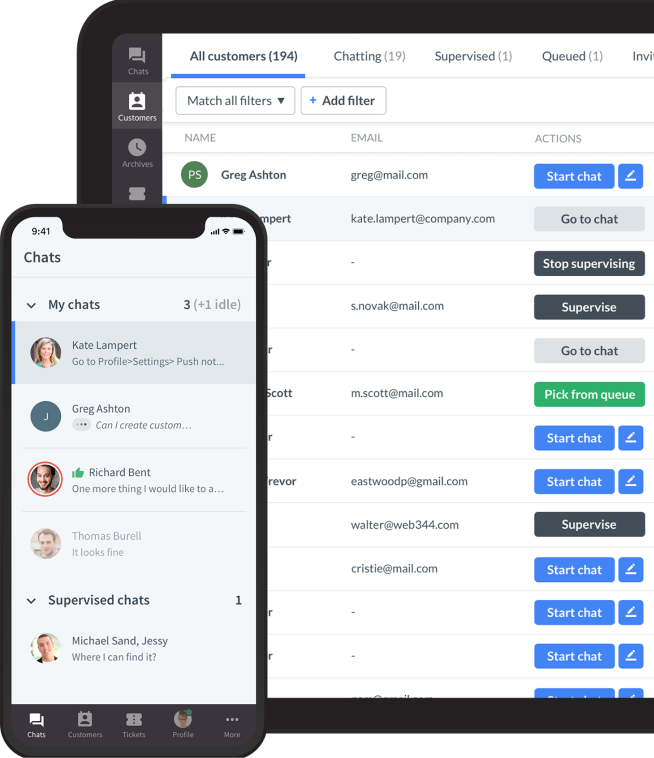Showing top 0 results 0 results found
Showing top 0 results 0 results found

You're in the midst of a crucial sales call, and the right words at the right time can make all the difference. That's where sales scripts come in.
They're your roadmap to effective communication, ensuring you're always on message, building rapport, and precisely addressing customer needs. Scripts are like your trusty compass, guiding you through conversations with potential clients, helping you navigate objections, and leading you to successful closures.
So, what exactly is a sales script?
Think of it as a carefully crafted dialogue framework designed for your sales conversations. It's not a rigid script that you memorize verbatim, but more of a guideline filled with key points, questions, and responses tailored to engage your customers effectively.
It's about having a structured approach while maintaining the flexibility to adapt to each unique interaction. A well-crafted script ensures you’re prepared, confident, and ready to handle whatever comes your way in a sales dialogue.
A step-by-step guide to crafting sales scripts
Research and preparation
- Product or service familiarity: Start by thoroughly understanding what you're selling. Get into the nitty-gritty details of your product or service, including features, benefits, and how it stands out from competitors.
- Market research: Immerse yourself in your industry's landscape. Keep tabs on trends, challenges, and competitors. This helps you anticipate questions and tailor your script to address market-specific issues.
- Preparing responses: Anticipate common questions or objections and prepare clear and concise responses. This preparation helps you stay composed during challenging parts of a sales conversation.
Understanding your audience
- Demographics and psychographics: Gather information on your audience's age, gender, location, job role, and even their interests or values. This shapes the tone and content of your script.
- Pain points and needs: Identify what problems your audience faces that your product or service can solve. Tailoring your script to address these directly makes your pitch more compelling.
- Customer persona development: Create customer personas representing your typical buyers. This exercise helps in visualizing and speaking directly to your audience's needs.
Creating a basic structure
- Introduction: Start with a brief, engaging introduction that states who you are and the purpose of your call or meeting.
- Key points outline: List the main points you need to cover. This should include a mix of product or service information, benefits, and how they address customer needs.
- Question integration: Prepare questions that encourage dialogue. This keeps the conversation two-way and helps uncover more about the customer's needs.
- Closing: Plan a strong closing that summarizes the conversation and proposes the next steps, be it a follow-up call, meeting, or sale closure.
Personalizing the script
- Customization for each call: Use the basic structure as a template and tweak it for each interaction, based on what you know about the prospect.
- Incorporate the prospect's language: If you've had previous interactions or have researched your prospect, use their own words or phrases. This shows attentiveness and builds rapport.
- Real-time adaptability: While using your script, be prepared to go off-script based on the conversation flow. This adaptability makes interactions more genuine and less robotic.
Role-specific scripts and adaptation
Examples for diverse professional roles
Imagine you're a real estate agent, a tech sales rep, or a financial advisor – each role demands a different flavor of sales script. For a real estate agent, your script might focus on the emotional aspects of home buying. As a tech sales rep, your script would be rich in product features and tech jargon suited to a knowledgeable audience. On the other hand, financial advisors would focus on trust-building and long-term planning in their scripts.
Industry-specific adaptations
Your script should also morph to fit the industry you're operating in. If you're in healthcare sales, your script needs to comply with industry regulations and focus on patient benefits. Selling in the fashion industry? Then your script should be trendy and lifestyle-oriented. Adapt your language, tone, and key points for each industry to match the environment you’re addressing. Remember, a one-size-fits-all approach doesn't work here – customization is key to resonate with your specific audience.
Balancing the script and spontaneity
Using scripts as guides, not verbatim
Remember that your sales script is a guide, not a script for a Broadway show. Stick to the essence of it but don't be afraid to veer off when needed. The goal is to have a natural, engaging conversation, not to recite lines. Use your script as a flexible framework that supports but doesn’t constrain your interactions.
Handling unpredictable sales scenarios
In the sales world, expect the unexpected. You might encounter questions or situations that your script doesn't cover. Here’s where your spontaneity comes in. Trust your instincts and knowledge. Listen actively, adapt your responses on the fly, and use the script as a fallback. This balance between preparation and adaptability is the secret sauce to thriving in dynamic sales environments.
Digital and traditional sales scripts
Strategies for email and social media
Your sales scripts need to be concise and engaging. For emails, start with a catchy subject line and open with a personalized greeting. Keep the body brief but informative, focusing on how your product or service solves a specific problem.
In social media, use a more relaxed tone. Engage with comments, and tailor your messages to the platform's style - be it LinkedIn’s professionalism or X's brevity.
Tips for inbound and outbound calls
For calls, whether inbound or outbound, your opening is crucial. Start strong with a friendly greeting and a clear introduction. In outbound calls, quickly establish the call's purpose. With inbound, listen first, then respond.
In both scenarios, keep a list of key points and questions handy to guide the conversation. Remember, your tone can set the stage for a successful call – stay positive, confident, and empathetic.
Common mistakes and how to avoid them
Overcoming common scripting pitfalls
- Avoiding monotone delivery: Ensure your script doesn’t make you sound monotonous. Practice varying your tone to keep the conversation lively and engaging.
- Steering clear of jargon overload: While industry terms are important, too much jargon can confuse the customer. Use simple language to explain complex concepts.
- Flexibility in conversation: Remember, rigid adherence to the script can make you miss cues for deeper customer engagement. Be prepared to deviate from the script based on the direction of the conversation.
- Balancing information: Provide enough information to intrigue and inform, but not so much that it overwhelms the listener.
Feedback and continuous improvement
- Post-call review: After each interaction, review your performance. What parts of the script worked well, and what didn’t resonate?
- Seeking constructive feedback: Regularly seek feedback from colleagues, supervisors, or mentors. Fresh perspectives can offer valuable insights into your script's effectiveness.
- Incorporating customer feedback: If you receive direct feedback from customers, use it to tweak your script. They’re the audience, after all!
- Continuous script refinement: Regularly update your script based on these insights. This keeps it fresh, relevant, and effective in your evolving sales landscape.
Post-script strategies
Follow-up actions
- Immediate follow-up: Send a quick thank-you email after your call or meeting. Summarize the key points discussed and the agreed next steps.
- Setting reminders: Use a CRM or a reminder system to follow up at the promised time. Consistency in follow-up shows reliability and professionalism.
- Customizing follow-up messages: Tailor your follow-up messages based on the conversation. Include references to specific points discussed to show attentiveness.
- Offering additional value: In your follow-ups, provide additional value – this could be a helpful article, a relevant case study, or an answer to a query raised during the conversation.
Building long-term customer relationships
- Regular check-ins: Schedule periodic check-ins, not just for sales but to understand their ongoing challenges and successes.
- Providing ongoing support: Offer continuous support and be accessible. This could mean being responsive to queries or providing assistance with the product/service post-purchase.
- Requesting feedback: Regularly ask for feedback on your product/service and the support provided. This shows that you value their opinion and are committed to improvement.
- Creating a community: Invite them to join user groups, webinars, or community events. This fosters a sense of belonging and keeps them engaged with your brand.
Tailoring scripts to modern sales challenges
As a sales professional, it's important to keep your finger on the pulse of the market. This means regularly updating your sales script to reflect current events, industry shifts, and evolving customer needs. For instance, if there's a surge in remote work solutions, ensure your script addresses how your product or service fits into this new norm.
Incorporating emerging sales techniques is equally important. For example, when selling through social media, your script should be more conversational and engaging, leveraging the unique features of each platform. It's about blending traditional sales methods with digital savvy, ensuring your approach remains relevant and effective in a world where the only constant is change.
These scripts are merely tools to guide you
They can adapt to various roles, industries, and the ever-changing sales landscape. Stay informed and keep personalizing your approach. Always view sales scripts as living documents, evolving with market trends and customer needs. Embrace continuous learning and adaptation - it's what keeps you ahead in the game. Stay curious, stay agile, and keep refining your sales craft.








Comments